Related Research Articles

Jean-Luc Godard was a Franco-Swiss film director, screenwriter, and film critic. He rose to prominence as a pioneer of the French New Wave film movement of the 1960s, alongside such filmmakers as François Truffaut, Agnès Varda, Éric Rohmer and Jacques Demy. He was arguably the most influential French filmmaker of the post-war era. According to AllMovie, his work "revolutionized the motion picture form" through its experimentation with narrative, continuity, sound, and camerawork. His most acclaimed films include Breathless (1960), Vivre sa vie (1962), Contempt (1963), Band of Outsiders (1964), Alphaville (1965), Pierrot le Fou (1965), Masculin Féminin (1966), Weekend (1967) and Goodbye to Language (2014).
Kaja Silverman is an American art historian and critical theorist. She is currently the Katherine and Keith L. Sachs Professor of Art History at the University of Pennsylvania. She received B.A. and M.A. degrees in English from the University of California Santa Barbara and a Ph.D. in English from Brown University. Thereafter, she taught at Yale University, Trinity College, Simon Fraser University, Brown University, the University of Rochester and for many years was the Class of 1940 Professor in the Rhetoric Department at the University of California, Berkeley. She was awarded a Guggenheim Fellowship in 2008, and is currently the holder of an Andrew W. Mellon Foundation Distinguished Achievement Award.
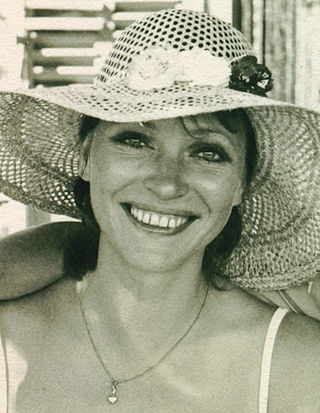
Anna Karina was a Danish-French film actress, director, writer, model, and singer. She was French New Wave director Jean-Luc Godard's early collaborator, performing in several of his films, including The Little Soldier (1960), A Woman Is a Woman (1961), My Life to Live (1962), Bande à part, Pierrot le Fou (1965), and Alphaville (1965). For her performance in A Woman Is a Woman, Karina won the Silver Bear Award for Best Actress at the Berlin Film Festival.

Breathless is a 1960 French New Wave crime drama film written and directed by Jean-Luc Godard. It stars Jean-Paul Belmondo as a wandering criminal named Michel, and Jean Seberg as his American girlfriend Patricia. The film was Godard's first feature-length work and represented Belmondo's breakthrough as an actor.
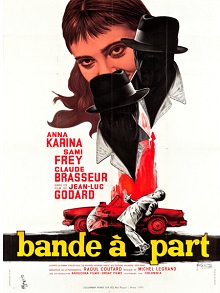
Bande à part is a 1964 French New Wave film directed by Jean-Luc Godard. It was released as Band of Outsiders in North America; its French title derives from the phrase faire bande à part, which means "to do something apart from the group". The film is about three people who commit a robbery. It received positive critical reviews, and its dance scene has been referenced several times in popular culture.

Contempt is a 1963 French New Wave drama film written and directed by Jean-Luc Godard, based on the 1954 Italian novel Il disprezzo by Alberto Moravia. It stars Brigitte Bardot, Michel Piccoli, Jack Palance, Fritz Lang, and Giorgia Moll.
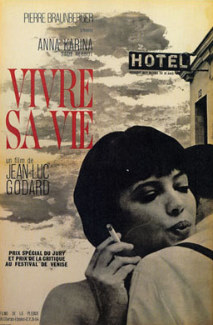
Vivre sa vie is a 1962 French New Wave drama film written and directed by Jean-Luc Godard. The film was released in the United States as My Life to Live and in the United Kingdom as It's My Life.

Raoul Coutard was a French cinematographer. He is best known for his connection with the French New Wave period and particularly for his work with director Jean-Luc Godard, which includes Breathless (1960), A Woman Is a Woman (1961), Vivre sa vie (1962), Bande à part (1964), Alphaville, Pierrot le Fou, and Weekend (1967). Coutard also shot films for New Wave director François Truffaut—including Shoot the Piano Player (1960) and Jules and Jim (1962)—as well as Jacques Demy, a contemporary frequently associated with the movement.

In Praise of Love is a 2001 French film written and directed by Jean-Luc Godard. The black-and-white and color drama was shot by Julien Hirsch and Christophe Pollock. Godard has famously stated that "a film should have a beginning, a middle and an end, but not necessarily in that order." This aphorism is illustrated by In Praise of Love, which reverses the order of past and present. It was selected as the Swiss entry for the Best Foreign Language Film at the 74th Academy Awards, but it was not nominated.

Aria is a 1987 British anthology film produced by Don Boyd that consists of ten short films by ten different directors, each showing the director's choice of visual accompaniment to one or more operatic arias. There is little or no dialogue from the actors, with most words coming from the libretto of the operas in Italian, French, or German.

Jean-Claude Brialy was a French actor and film director.
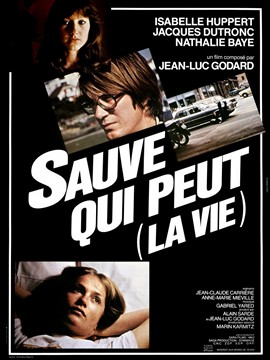
Every Man for Himself is a 1980 drama film directed, co-written and co-produced by Jean-Luc Godard that is set in and was filmed in Switzerland. It stars Jacques Dutronc, Isabelle Huppert, and Nathalie Baye, with a score by Gabriel Yared. Nathalie Baye won the César Award for Best Supporting Actress. It also was submitted as the Swiss entry for the Best Foreign Language Film at the 53rd Academy Awards, but was not accepted as a nominee.

Domiziana Giordano is an Italian artist, actress, photographer, and video artist. Giordano has played roles in work directed by Mauro Bolognini, Jean-Luc Godard, Neil Jordan, Ken McMullen, Nicolas Roeg, and Andrei Tarkovsky, amongst others.
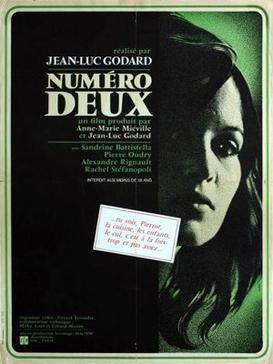
Number Two, by Jean-Luc Godard and Anne-Marie Miéville, is a 1975 experimental film about a young family in a social housing complex in France. The film's distinct style involves presenting two images on screen simultaneously, leading to multiple interpretations of the story and to comments on the film-making and editing process.

King Lear is a 1987 film directed by Jean-Luc Godard, an adaptation of William Shakespeare's play in the style of experimental French New Wave cinema. The script was primarily by Peter Sellars and Tom Luddy. It is not a typical cinematic adaptation of Shakespeare's eponymous tragedy, although some lines from the play are used in the film. Only three characters – Lear, Cordelia and Edgar – are common to both, and only Act I, scene 1 is given a conventional cinematic treatment in that two or three people actually engage in relatively meaningful dialogue.

Passion is a 1982 film by Jean-Luc Godard, the second full-length film made during his return to relatively mainstream filmmaking in the 1980s.

Histoire(s) du cinéma is an eight-part video project begun by Jean-Luc Godard in the late 1980s and completed in 1998. The longest, at 266 minutes, and one of the most complex of Godard's films, Histoire(s) du cinéma is an examination of the history of the concept of cinema and how it relates to the 20th century; in this sense, it can also be considered a critique of the 20th century and how it perceives itself. The project is widely considered Godard's magnum opus.
The Centre pour l'Image Contemporaine or CIC was a contemporary art exhibition centre in Geneva, Switzerland. CIC was established in 1985 to organize events and exhibitions of images using new technologies such as video, multimedia, and the Internet, as well as more traditional photography and film. It was also named Saint-Gervais Genève between 1985 and 2008 when including several departments: Electronic media, Exhibitions, Theatre. Its existence goes from 1985 to 2008.

Freddy Buache was a Swiss journalist, cinema critic and film historian. He was the director of the Swiss Film Archive from 1951 to 1996. He was a privatdozent at the University of Lausanne.
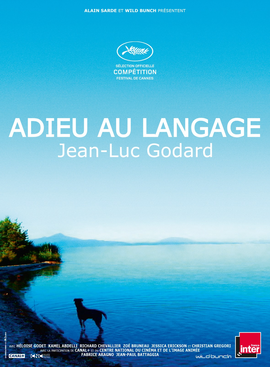
Goodbye to Language is a 2014 French-Swiss narrative essay film written and directed by Jean-Luc Godard. It stars Héloïse Godet, Kamel Abdeli, Richard Chevallier, Zoé Bruneau, Jessica Erickson and Christian Grégori and was shot by cinematographer Fabrice Aragno. It is Godard's 42nd feature film and 121st film or video project. In the French-speaking parts of Switzerland where it was shot, the word "adieu" can mean both goodbye and hello. The film depicts a couple having an affair. The woman's husband discovers the affair and the lover is killed. Two pairs of actors portray the couple and their actions repeat and mirror one another. Godard's own dog Roxy Miéville has a prominent role in the film and won a prize at the Cannes Film Festival. Like many of Godard's films, it includes numerous quotes and references to previous artistic, philosophical and scientific works, most prominently those of Jacques Ellul, Aleksandr Solzhenitsyn and Mary Shelley.
References
- ↑ Nouvelle Vague at the IMDB
- ↑ Box office information for film at Box Office Story
- ↑ "Festival de Cannes: Nouvelle Vague". festival-cannes.com. Retrieved 2009-08-05.
- ↑ Silverman, Kaja; Farocki, Harun (July 1998). Speaking about Godard. NYU Press. ISBN 0814780660.
- ↑ Brody, Richard (23 June 2009). Everything is Cinema: The Working Life of Jean-Luc Godard. Picador. ISBN 978-0805080155.
- ↑ "Nouvelle Vague critic reviews". Rotten Tomatoes. Retrieved 2008-09-24.